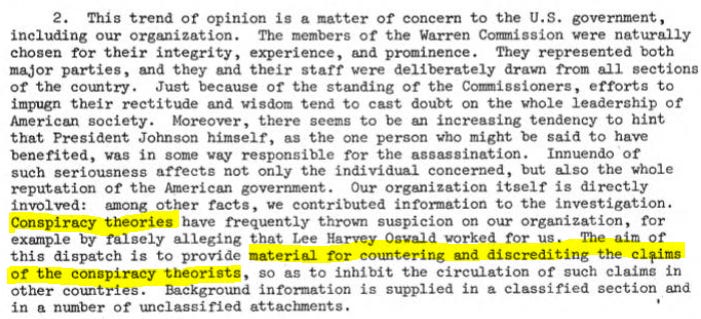CIA Files: Operation Mockingbird
Learn about the covert influence of Operation Mockingbird: Top 10 instances of CIA manipulation in media and culture exposed.
Did you ever wonder just how much of what we see and hear in the media is really our own opinion? It’s easy to assume that the stories we read in newspapers or watch on TV are unbiased reflections of the world.
But what if I told you that for decades, the government was pulling the strings behind the scenes?
Enter Operation Mockingbird—a covert CIA program designed to manipulate the media and control public opinion.
Through this operation, the CIA has actively shaped the narrative, influence minds, and steer the cultural ship in directions that served their interests.
But why does it matter now? Didn’t it end with the Church Committee in the 1970s?
In short - No.
While the CIA claimed to have shut down the operation in 1976, not everyone bought that story. In fact, researchers like Steve Kangas, Angus Mackenzie, and Alex Constantine argue that the program didn’t end—it just went underground.
Take Steve Kangas, for example. In 1998, he claimed that Richard Mellon Scaife, a wealthy CIA asset, was running Forum World Features—a supposed foreign news service that, in reality, acted as a front for spreading CIA propaganda across the globe.
Bold of him. A bit too bold. Here’s where things take a dark turn.
On February 8, 1999, Kangas was found dead in the bathroom of Scaife’s Pittsburgh offices.
Cause of death?
Suicide, of course. A gunshot wound to the head.
But the circumstances raised A LOT of eyebrows:
The police report said the gunshot wound was on the left side of his head, yet the autopsy revealed it was through the roof of his mouth. (more magic Kennedy bullets)
Kangas’ computer hard drive had mysteriously been wiped shortly after his death. Crazy thing for a dead person to do.
Scaife himself reportedly assigned his top private investigator, Rex Armistead, to dig into Kangas’ past.
Was Kangas digging too deep into Operation Mockingbird’s shadowy remnants? Or was this just an eerie coincidence?
I think you know.
Either way, it’s clear that Operation Mockingbird isn’t just a relic of the past.
Understanding Operation Mockingbird isn’t just about delving into history—it’s about recognizing the blueprint for media manipulation. It’s about asking hard questions: How many of today’s headlines are really conjured or manipulated by the government?
The best way to learn a blueprint is to spot the patterns. From secret deals with journalists to shaping international politics, we’ll expose the top 10 ways Operation Mockingbird infiltrated the media.
Section 1: What Was Operation Mockingbird?
Historical context: The Cold War and CIA’s role
Goals of the operation: Influence public opinion and foreign policy
Key players: Journalists, media outlets, and CIA operatives
Section 2: Top 10 Examples of Operation Mockingbird in Action
The Washington Post Connection
The Washington Post wasn’t just reporting the news—it was helping shape it. Under publisher Philip Graham, the Post became a central hub for Operation Mockingbird. Graham, a trusted CIA ally, ensured the paper pushed narratives aligned with U.S. government interests. Ever notice how the Post seemed to support every Cold War move? That wasn’t an accident.
Influence in the New York Times
If you thought the Post was alone, think again. The New York Times had its share of CIA ties, with journalists and editors feeding the agency insider information. These relationships weren’t just casual—they were cultivated to ensure stories critical of the CIA rarely saw the light of day. The "paper of record" often became the "paper of propaganda."
The Media Blitz on the Cuban Missile Crisis
During the Cuban Missile Crisis, Mockingbird showed its real power. The media was flooded with stories emphasizing the U.S. as a restrained yet powerful force, carefully navigating the brink of nuclear war. Meanwhile, behind the scenes, the CIA controlled the flow of information to hide how close we came to disaster.
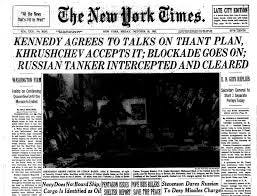
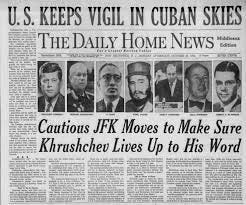
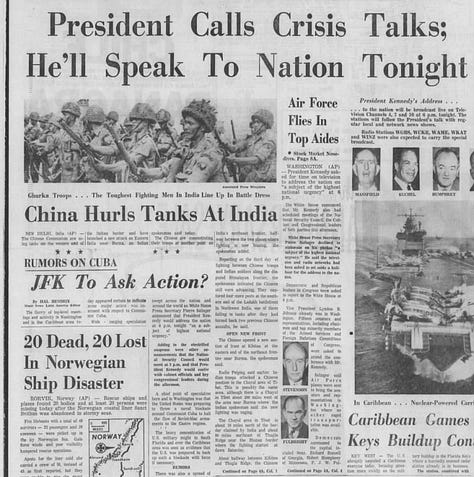
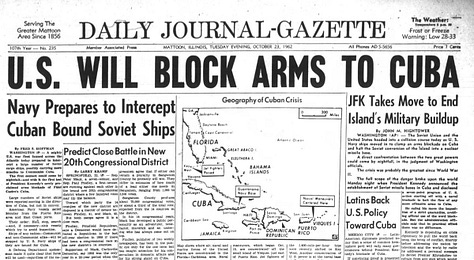
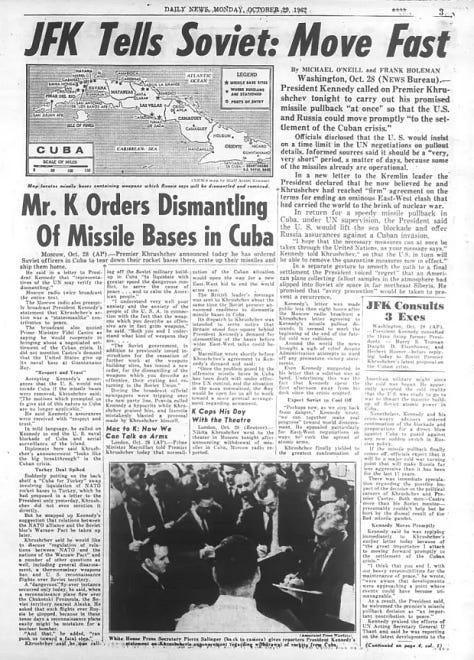
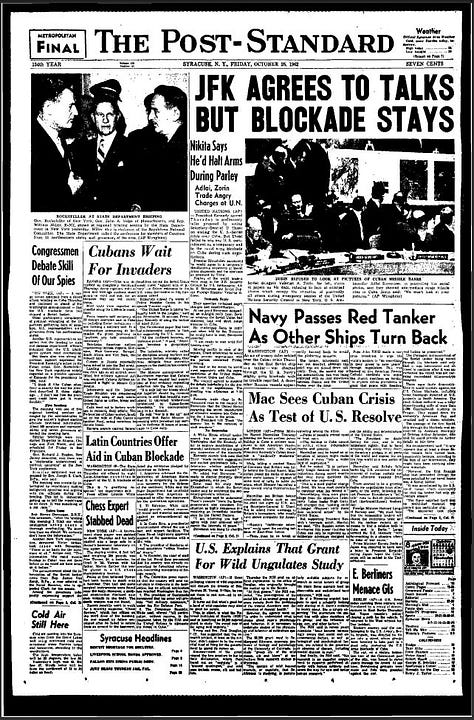
Example of Newspaper Headlines The 1953 Iranian Coup (Operation Ajax)
Remember the 1953 coup in Iran? Probably not, because Mockingbird made sure the public saw it as a "necessary intervention." By planting stories demonizing Prime Minister Mohammad Mossadegh, the CIA softened public opinion for the coup that installed the Shah. Sounds a lot like what happened recently in Syria… The result? Decades of instability disguised as progress. Same thing happened in Chile’s 1973 Coup.
Vietnam War Coverage
The Vietnam War was a quagmire, but Mockingbird made sure Americans didn’t know that—at least, not initially. Through sanitized coverage, heroic imagery, and buried dissenting voices, the CIA shaped public opinion to support the war. By the time the truth emerged, the damage was already done.
The Watergate Scandal
While the Watergate scandal exposed corruption at the highest levels, it’s been shown that Mockingbird operatives leaked certain details to control the fallout. Was this a genuine act of journalism or an attempt to steer the narrative away from deeper CIA involvement? I think you know.
Civil Rights Movement Coverage
Mockingbird didn’t stop at foreign policy—it infiltrated domestic issues too. During the Civil Rights Movement, certain media outlets ran stories aiming to discredit leaders like Martin Luther King Jr. By portraying activists as radicals or pawns of communist forces, Mockingbird sought to undermine the movement’s legitimacy. The FBI ran interference with this too through COINTELPRO - FBI agents infiltrated groups like the Black Panthers to purposefully radicalize them. They also submitted salacious, unfounded stories to news reporters that would demonize the civil rights leaders.
JFK Assassination and the Birth of 'Conspiracy Theory'
After the assassination of John F. Kennedy, Mockingbird launched into overdrive. The term "conspiracy theory" was popularized to discredit anyone questioning the official story. Think about that next time someone dismisses critical thought with a smug "That’s just a conspiracy theory."
“Weird” Republicans – 2024 Election
Fast forward to the present. Mockingbird continues to influence how political figures—especially outsiders—are portrayed. In the 2024 elections, Republican candidates challenging the establishment were branded, in a very coordinated effort, as “weird”. Sound familiar? The playbook doesn’t seem to have changed much.
9/11 – Explosions in the Building
The tragic events of September 11, 2001, sparked countless questions, but Mockingbird-style tactics ensured only certain narratives gained traction. Reports of explosions in the buildings before the towers collapsed were downplayed or dismissed outright. Overtime, they were simply wiped from any narrative. Why? Pull that thread and you may just have to wear a tinfoil hat.
The Downfall of Modern Media and Journalism
Modern media isn’t just struggling—it’s free-falling. Once seen as the trusted gatekeepers of truth, many major news outlets have lost their grip on public trust and influence. By all accounts, it would seem that Operation Mockingbird overplayed its hand.
Once upon a time, outlets like The Washington Post and The New York Times dominated the media landscape, but their influence is waning fast. People are increasingly skeptical about whether these organizations report the truth or spin a pre-approved narrative.
A Gallup poll in 2023 revealed that only 26% of Americans had confidence in newspapers, and trust in TV news was even lower, at 18%. Meanwhile, Pew Research Center data shows cable news networks like CNN and MSNBC have experienced double-digit declines in viewership over the past five years. Even giants like The New York Times, despite a digital subscription boost during the Trump era, are struggling to maintain growth as skepticism about biased reporting grows.
The Rise of Independent Journalism
As trust in legacy media crumbles, independent journalism is surging. Platforms like Project Veritas, formerly led by James O’Keefe, have become household names for exposing corruption and media manipulation. Whether it’s uncovering bias at Google or misconduct in political campaigns, O’Keefe’s work (now through OMG) thrives on a simple principle: show people the unedited truth.
And he’s not alone. Figures like Matt Taibbi, Joe Rogan, and platforms like Substack and Rumble have carved out spaces for no-nonsense reporting, free from corporate or governmental strings. These independent voices offer an antidote to the carefully crafted narratives of mainstream outlets, and their growing audiences prove people are hungry for something real.
Writers like Taibbi boasting tens of thousands of paid subscribers—numbers traditional outlets would envy. Meanwhile, Project Veritas videos routinely rack up millions of views, far eclipsing many network news segments.
Consider this: In 2023, Fox News, one of the top cable networks, saw a 33% drop in primetime viewership after major scandals and lawsuits, while CNN dropped 41% in the same period. Compare that to the surge in podcast downloads, Rumble views, and independent platforms’ subscriber bases, and the shift becomes crystal clear. People are ditching the old guard (sometimes called Mainstream Media or Legacy Media) for new voices.
What’s Next for Mockingbird?
So, where does Operation Mockingbird leave us today? The official story is that it ended in 1976, but history has a funny way of repeating itself—or maybe it never truly stops. The tactics pioneered by Mockingbird—manipulating narratives, controlling public perception, and silencing dissent—seem eerily familiar in today’s media landscape.
While traditional journalism crumbles under the weight of declining trust and viewership, we’re left with a critical question: have those who once pulled the strings simply moved on to new platforms and methods? With the rise of social media and the internet, the tools for mass manipulation have only grown more sophisticated.
And that brings us to Operation Earnest Voice. If Mockingbird was about controlling the news, Earnest Voice is about dominating the conversation online. Developed by the U.S. military, this program focuses on creating fake personas to influence social media debates and spread propaganda. Sounds like Mockingbird’s digital cousin.
As we move forward, one thing is clear: the battle for the truth is far from over. For us, that means staying vigilant, asking hard questions, and digging deeper than the headlines. Because if Mockingbird taught us anything, it’s this: the real story is often the one they don’t want you to see.
The truth may be out there—but it’s up to us to find it.
Operation Earnest Voice: The Future of Propaganda (Mockingbird 2.0)
What if the battlefield wasn’t on the ground, but in your mind? That’s the world we live in today, where wars are fought with words, not just weapons. Enter Operation Earnest Voice (OEV). To shape narratives, combat extremist propaganda, and sway public opinion across the globe.










